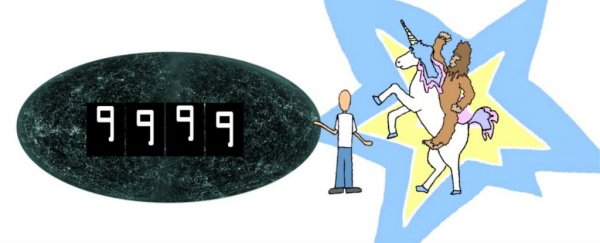We learn about the concept of infinity pretty early on in life. It's the best way to get a one-up on your friends and family, until someone teaches you the 'infinity plus one' rule, which is actually a whole lot more complicated than you might think (don't click unless you feel like melting your brain). But does infinity actually exist in reality, or is it just one of those mathematical concepts that exists purely for the benefit of mathematicians? Is infinity really a thing?
As the Explanimator video above, erm, explains, one real-world scenario for infinity is an infinite bag of potato chips. In a regular bag of potato chips, you usually get a few that are kind of burnt and crispy. Let's say one in 10 chips are burnt and crispy, and let's apply that rule to the infinite bag of potato chips (which we've already come to hate because it sounds so awesome and we'll never ever have one).
So now we've got an infinite number of chips, one in 10 of which are burnt. If you tossed a bunch on the floor, you'd see way more normal chips than burnt ones.
But if you started matching them up - the first normal chip with the first burnt chip - because it's an infinite bag, for every normal chip, you'll find a burnt chip. And that doesn't make sense, because there are supposed to be 10 times more normal chips, but it makes perfect sense, because infinity.
If your brain started to hurt when you considered all of that - good. The better you understand it, the harder it should be.
So if no one's ever seen or measured anything even close to infinity, how can we know if it has any basis in reality?
Well, if it did, you could reasonably propose that there could be an infinite number of something (yes, like potato chips) that exists in the Universe. That would mean the Universe would have to be infinite to house that infinite number of things, and while we don't actually know how big the Universe actually is, the part we know exists has a finite size.
Okay, but what if the thing that's infinite was incredibly, almost impossibly, small? "As you shrink down, infinity lets you fill up space as much as you like, meaning for every two points, you can always find a new point in between," explains the video above. "Sort of like a rubber band - so even a finite distance might have infinite points in between."
But can we actually split up space infinitely? Or can you dig deep down into its fundamental building blocks and arrive at its smallest possible point, kind of like pixels on a screen?
I'll let the latest episode of Explanimator handle that one, and when you're done there, watch below to see an old-timey calculator lose its mechanical mind when it tries to divide by zero. We are one and the same, old-timey calculator. One and the same.
